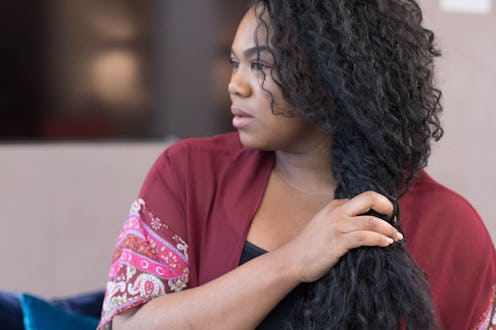
When you think of hair loss, you may think of your dad or grandfather, but many women also suffer from hair loss — and for far different reasons than your grandfather. According to the American Academy of Dermatology, 40 percent of women suffer from "visible" hair loss before they're 40. In the U.S. alone, 80 million men and women suffer hair loss, later in life, due to hereditary conditions.
While normal hair loss — 50 to 100 hairs a day — isn't anything to worry about, it may be time to see a doctor if you start to notice more than that. Luckily, there are things that can be done to reverse the hair loss process or even put an end to it.
"One suggestion is to journal the process, starting with the point at which hair loss was discovered, being careful to note any changes in hair care practices or health issues," Dr. Shari Hicks-Graham, a board-certified dermatologist and founder of LivSo, tells Bustle. "Medication and dietary changes are important to note."
But while going to a doctor can definitely give you some pointers, here are some unexpected things that could be leading to your hair loss, according to experts.
1Your Hair Care Routine
Although we often don't think about it, hair care can definitely cause women to lose their hair.
"From hair styles, to hair products, to perms, and bleaching, especially, can cause hair breakage," Dr. Jen Caudle, family physician and associate professor at Rowan University School of Osteopathic Medicine, tells Bustle. "Devices too, like hairdryers, and especially flat irons, if the heat is too high, it can cause hair to fall out."
If you're noticing unusual hair loss, think about how you're styling your hair, the products you're using, and the devices you use regularly on your hair.
2Brushing To Often
Believe it or not, you can brush your hair too much, Dr. Caudle says. The average head of hair — and I'm talking amongst healthy millennials and not your father or grandfather — loses 50 to 100 hairs a day.
So forget the silly old-wive's tale that brushing your hair 100 times a day will make it longer; if anything, it's going to make it thinner.
3Taking Too Many Vitamins
For all the hype that vitamins get, they're not without their flaws. Also, not every vitamin is a fit for every person. For example, too much vitamin A and D, as well as excessive protein can be a culprit when it comes to losing hair.
It's important to have a healthy diet with the right amount of nutrients and vitamins in order to keep you hair healthy.
4A Traumatic Event
As Dr. Caudle points out, traumatic events that can cause a massive amount of stress can also lead to hair loss. Stress can truly reck havoc on all parts of the body, the hair follicles included. While you won't start losing clumps or anything equally dramatic, you will notice thinning of your hair. At least until you get your stress back under control.
5Prescription Drugs
"Many people don't know this, but birth control can cause you to lose your hair," Dr. Caudle says. "As do blood-thinning medications and antidepressants." That's why it's important to talk to your doctor about possible side effects. Not all medications deliver the same negative side effects, but if you're someone who naturally has thin hair then you want to be wary of these things.
6A Greater Medical Condition
Although it goes without saying that cancer, especially cancer that's being treated with chemotherapy, can cause hair loss, it's not the only condition. According to Dr. Caudle, conditions like diabetes, anemia, and a thyroid that's out of balance, also cause hair loss. However, at least in the case of thyroid, the hair can grow back, once the issue is under control.
If you notice you're losing more hair than usual, it could be something as simple as what you're doing during your morning routine. But if you can rule out your hair or vitamin habits, make sure to consult a professional to figure out teh cause.